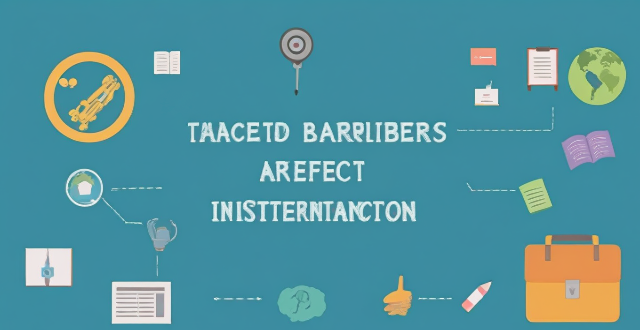The article discusses the impact of language barriers on the learning experience of international students, including communication difficulties in lectures and class discussions, academic challenges in reading assignments, writing tasks, and test-taking, as well as social integration issues such as making friends and participating in campus life. It also suggests strategies to overcome these barriers, such as utilizing educational support services, technology tools, and active participation in language exchange programs.

The Impact of Language Barriers on the Learning Experience of International Students
Language barriers can significantly affect the learning experience of international students in various ways. Here are some key points to consider:
Communication Difficulties
- Understanding Lectures: International students may struggle to comprehend lectures if they are not delivered in their native language. This can lead to missed information and confusion about course content.
- Participating in Class Discussions: Language barriers can make it difficult for international students to actively participate in class discussions, which is an essential part of the learning process. They may feel hesitant to speak up or express their ideas clearly.
- Asking Questions: Students who face language barriers might be less likely to ask questions during class or office hours due to fear of miscommunication or being misunderstood.
Academic Challenges
- Reading Assignments: International students may have difficulty understanding complex academic texts written in a foreign language, which can hinder their ability to complete reading assignments effectively.
- Writing Assignments: Producing well-written essays, reports, or research papers in a non-native language can be challenging for international students. They may struggle with grammar, vocabulary, and organization, affecting their grades and overall academic performance.
- Test Taking: Language barriers can also impact test-taking abilities, as international students may have trouble understanding questions or expressing their knowledge in a clear and concise manner.
Social Integration
- Making Friends: Language barriers can make it harder for international students to establish friendships with domestic students who speak the local language fluently. This can lead to feelings of isolation and exclusion.
- Cultural Exchange: Language barriers can limit opportunities for cultural exchange between international students and their peers, preventing them from fully experiencing and appreciating the host culture.
- Participating in Campus Life: Language difficulties can also hinder international students' involvement in extracurricular activities, clubs, and organizations on campus, which are crucial for personal growth and networking.
Strategies to Overcome Language Barriers
- Educational Support Services: Many universities offer support services such as ESL (English as a Second Language) classes, writing centers, and tutoring programs to help international students improve their language skills and cope with academic challenges.
- Technology Tools: Utilizing technology tools like translation apps, dictionaries, and online resources can assist international students in bridging the language gap and enhancing their learning experience.
- Active Participation: Engaging in language exchange programs, joining conversation clubs, and seeking out opportunities to practice the local language with native speakers can help international students overcome language barriers and foster social connections.
In conclusion, while language barriers can pose significant challenges for international students, there are various strategies and resources available to help them overcome these obstacles and succeed academically and personally during their study abroad journey.